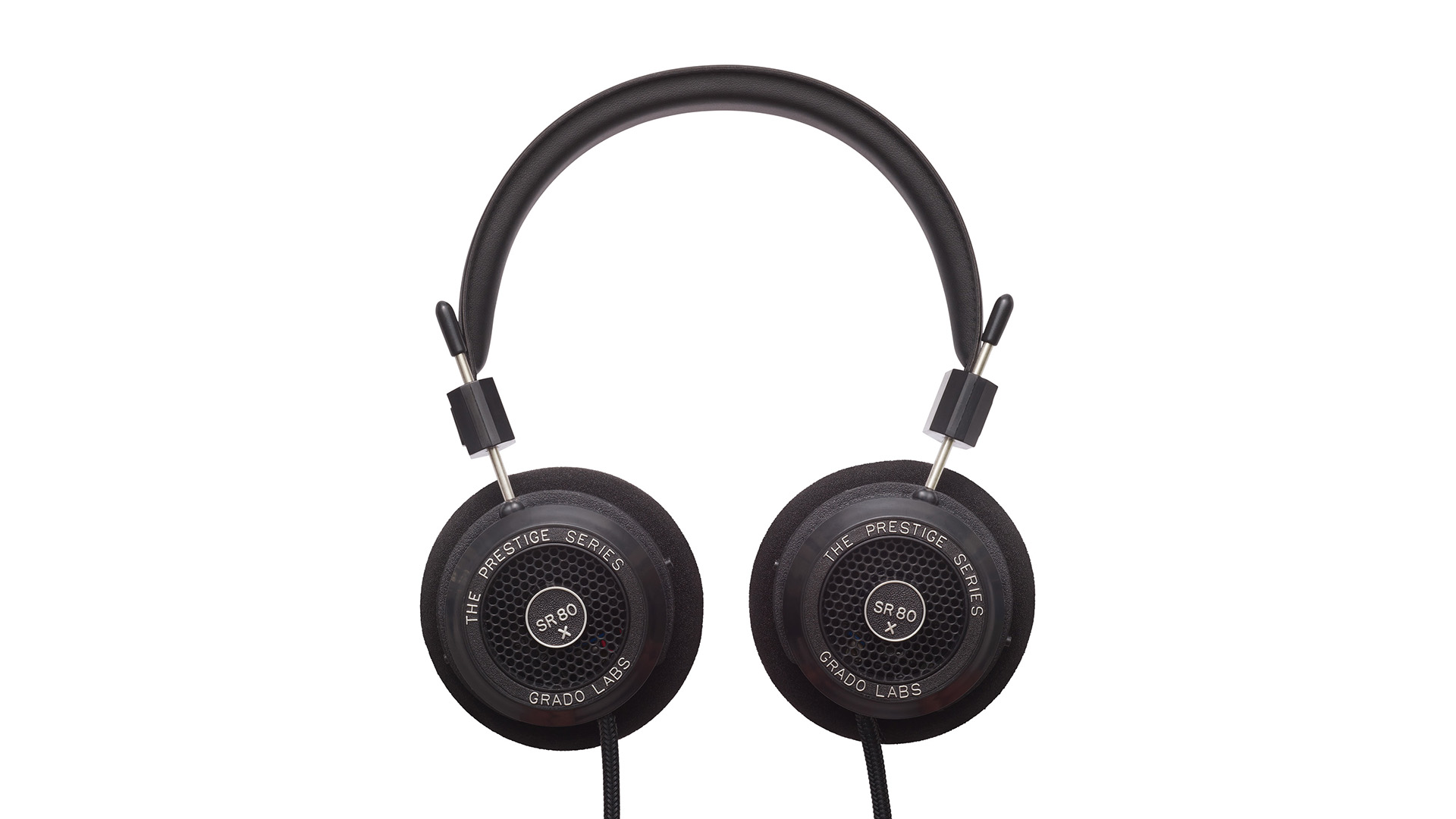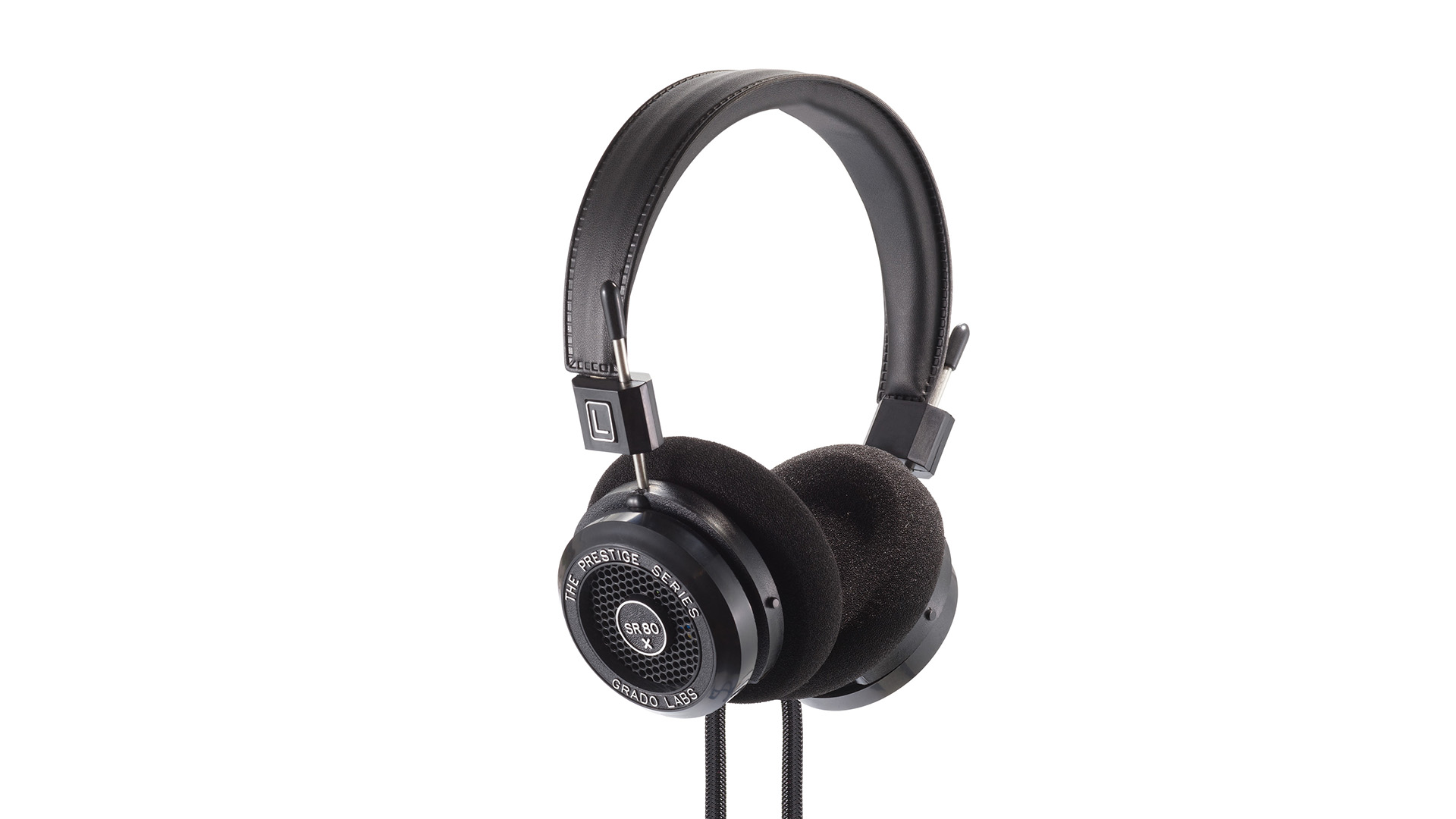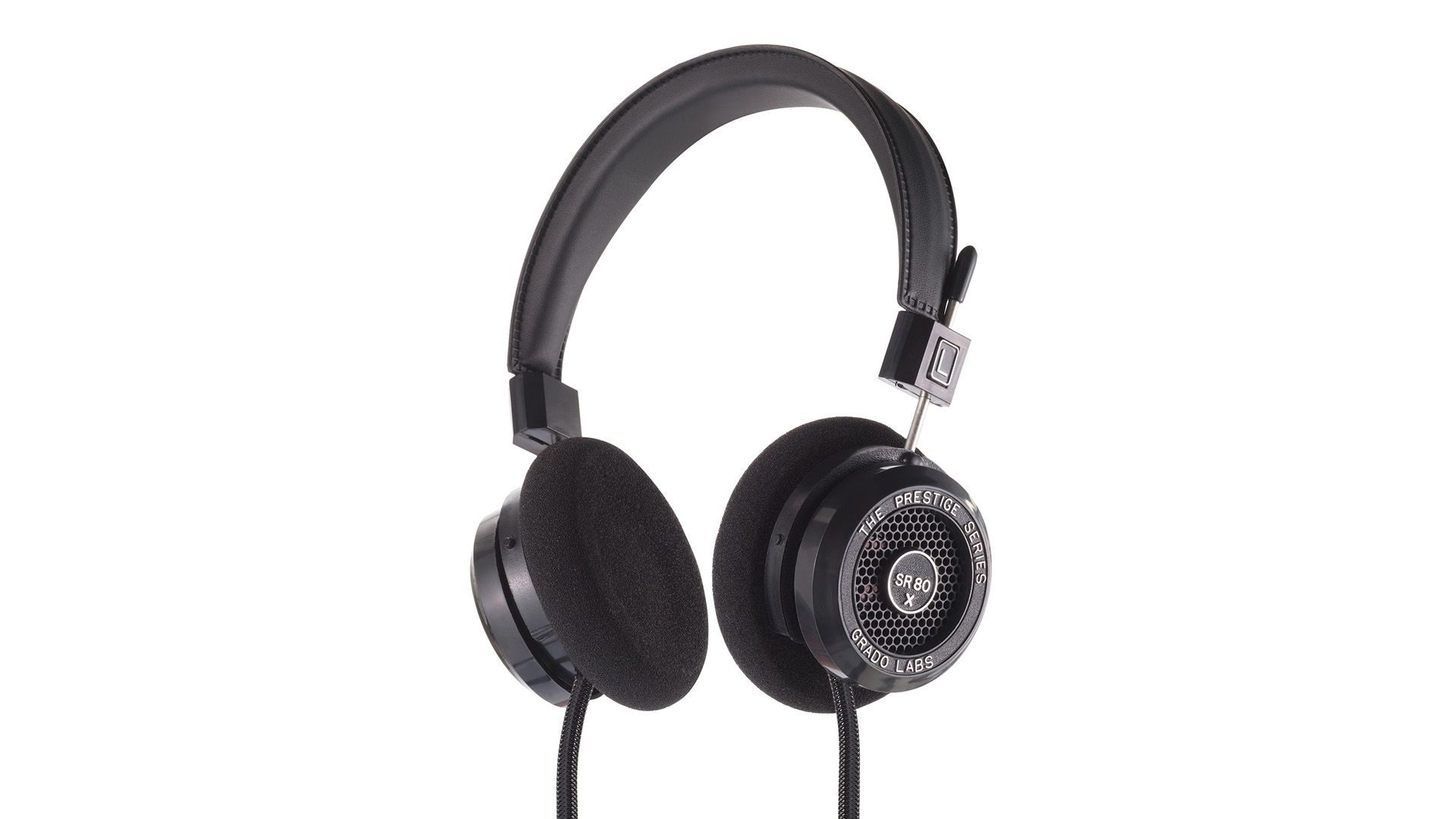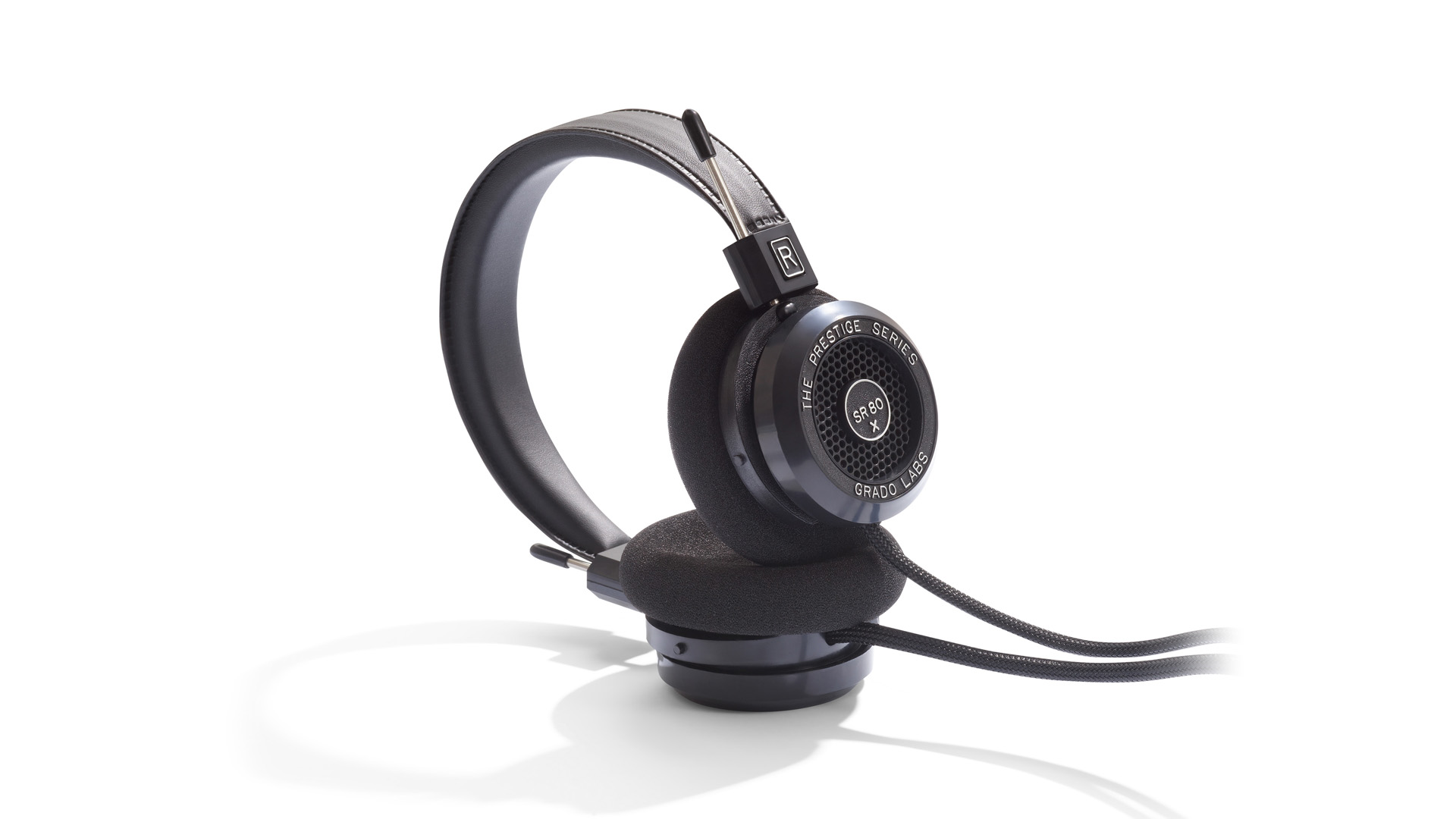What Hi-Fi? Verdict
Detailed and articulate wired open-back headphones that are great for home use
Pros
- +
Punchy, musical performers
- +
Class-leading insight
- +
Light and comfortable
Cons
- -
Very leaky
Why you can trust What Hi-Fi?
If Grado was to open its own museum, the original SR80 headphones would have a strong chance of being selected as the collection’s most-treasured, feature item; the Crown Jewels of the Tower of London’s trove. They are, after all, what the Brooklyn-based company counts as its first-ever pair – built on the Grado family’s kitchen table in 1991, and the foundation on which it built its open-back headphones empire. “We wouldn’t be here today without it,” reads Grado literature.
The SR80 have spawned many variants within the company’s Prestige Series in the three decades since, and the fact that they are still a part of the all-new Prestige X Series makes them the longest-running Grado model. The all-new Grado SR80x succeeds the 2014-released, multi-What Hi-Fi? Award-winning SR80e from the previous Prestige E Series.
Prestige X is now the company's entry-level headphones range, sitting just beneath the Reference Series, with the SR80x the second-most affordable pair in the Grado catalogue after the SR60x. At £129.95, $125, AU$179, the SR80x are by today’s standards billed as budget on-ear headphones, suitable mostly for home use due to their wired, open-back nature, meaning they inherently leak sound both in and out. Surrounding noise will be audible to you (unless you’re listening to heavy metal at high volumes), and the music you’re playing will be audible to others (especially if you’re listening to heavy metal at high volumes).
- Our pick of the best wired headphones
Design

That open-back characteristic is flagged aesthetically by the distinctly holey ear cups through which sound leaks. While, unsurprisingly, Grado continues to diligently stick to the industrial aesthetic it is so well known for, simply looking at the SR80e and new SR80x side by side provides some clues as to their different generational identities. The ‘e’ on the ear cup is now – you guessed it – an ‘x’; the 1.8m cable is a 4-conductor one, with a new, rugged and grippy braided jacket; and the cushioning on the underside of the pleather headband is notably thicker this time. Probably the last disparity to be rung in a game of Spot The Difference would be the new headband’s very slightly different stitching.
The circular foam earpads will physically cover most ears and rest against them firmly yet comfortably. Considering the same earpads on the SR80e, which we’ve used periodically for a number of years, have largely kept their shape and padding, we can vouch for their durability, too.

Transducer type Dynamic
Operating principle Open air
Frequency response 20-20,000hz
Impedance 38 ohms
We find the SR80 lightweight enough to get away with the SR80e’s non-padded headband, but that’s not to say the SR80x’s padding isn’t welcome; it certainly helps maintain a less burdensome listening experience, especially during those multi-hour sessions. And while the headband slider is pretty basic, it’s fit for purpose to allow for a reasonable degree of head adjustment.
It’s what you can’t see that really warrants Grado ushering in a next-generation Prestige range, though. Inside the SR80x and their Prestige X siblings is a new, fourth-generation 44mm driver, which utilises both a more powerful magnetic circuit for improved efficiency and a newly designed, lower-mass voice coil and diaphragm to further reduce distortion. This, Grado says, not only makes for a superior-sounding pair of headphones but one that is also easier to drive by a variety of portable devices. Note that the Grados are 3.5mm-ended for such purpose, but they do come with a 6.3mm adapter for components with that headphone socket.
Sound

During our fortnight with the SR80x, we plug them into a Samsung Galaxy S21 phone (via a USB-C-to-3.5mm adapter), the iFi Zen DAC connected to an Apple MacBook Pro laptop, an Astell & Kern A&norma SR15 music player and Naim’s Uniti Atom streaming system, and the Grados never feel poorly driven or out of their depth with the more sophisticated electronics in that list. The SR80x might be considered budget headphones, but their class-leading transparency means they can satisfyingly participate in a more sophisticated set-up.
Having already experienced a Prestige ‘e’ to ‘x’ transformation in the pricier SR325x, we come into this review of the SR80x hoping – and expecting – to hear similar sonic magic brought by the new driver. And it’s a tick in the box for consistency, the SR80x also proving clearer, cleaner and more detailed than their predecessor. Play Billie Eilish’s Lost Cause through both and the simple drum and bass loop rhythm has more presence through the SR80x – extra kick and space around it, too. Her vocal, meanwhile, isn’t just pulled closer into the headspace but all the more palpable and, consequently, sensual for the extra texture the SR80x rustle up.
Everything we like about their predecessors – their nimble-footedness, expressive, rolling dynamics, and insight across well-defined frequencies – has been inherited, and the punch and panache that have made the Prestige models such born entertainers are very much also part of the SR80x’s sonic signature. These are far from rich or even warm in tone, but an extra generous sprinkling of refinement this time round has made their forward, clinical presentation all the more palpable.
This is the type of headphones experience that forces us to listen to whole albums during our testing, and before we know it we’re emotionally engrossed in Eilish’s Your Power and stomping along carefree to Therefore I Am.
Verdict
The pay-off for their exceptionally open and dynamically fluid delivery is one that is pretty leaky, but if you can live with the fact these are headphones best suited for quiet environments and ‘me’ time, you won’t be disappointed.
Grado hasn’t torn up its own rulebook and revolutionised its legendary headphones, because it hasn’t needed to. But the tweaks made to the SR80x have certainly added value in the right direction. At this money, the SR80 model remains the finest in the market, and such is their dominance in this niche that we wouldn’t be surprised if this were true for as long as wired headphones have their place in this world.
SCORES
- Sound 5
- Comfort 4
- Build 4
MORE:
See all the What Hi-Fi? Awards 2022 winners
The best headphones money can buy
Pick up a bargain with the best cheap headphones deals
What Hi-Fi?, founded in 1976, is the world's leading independent guide to buying and owning hi-fi and home entertainment products. Our comprehensive tests help you buy the very best for your money, with our advice sections giving you step-by-step information on how to get even more from your music and movies. Everything is tested by our dedicated team of in-house reviewers in our custom-built test rooms in London, Reading and Bath. Our coveted five-star rating and Awards are recognised all over the world as the ultimate seal of approval, so you can buy with absolute confidence.
-
Lossless Jeff It begs the question:Reply
With the SR80x being so good, are the SR325x worth more than double the price tags? Even more if you're also going to get new earpads with the latter.
Are we getting only metal casing, or significantly better sound with the SR325x? -
Tamada It's a personal taste, but leaky headphones kind of beat the purpose of headphones. Headphones are for isolating you from external sound as much as isolating the others from your sound.Reply
So that you don't impose your music to your office colleagues, or partner, or fellow commuters.
Which brings the question, are there any good closed headphones that are as comfortable on the long run, and performant, as opened ones ? -
nopiano Reply
Hasn’t that been the case ever since the 80 and 325 were available? For my limited use, I find the earlier SR80e to be great, and the quirky design is appealing too.Lossless Jeff said:It begs the question:
With the SR80x being so good, are the SR325x worth more than double the price tags? Even more if you're also going to get new earpads with the latter.
Are we getting only metal casing, or significantly better sound with the SR325x?
I have only listened to the 325 at shows, but I dare say they offer enhanced range and subtlety in the right system. -
nopiano Reply
There are some headphone experts who contribute here, but you should look through the WHF reviews for some pointers.Tamada said:Which brings the question, are there any good closed headphones that are as comfortable on the long run, and performant, as opened ones ?
Personally, I’ve never liked closed models, though I own some closed AKG, but I’m old enough to remember the old Koss ‘head crushers’ from the 1970s. When Sennheiser came along with the HD414, not only did they sound like music rather than tea cups, but they were blissfully comfortable too. -
Gray Reply
...like a vice!nopiano said:I’m old enough to remember the old Koss ‘head crushers’ from the 1970s.
I had the Koss Pro 4AA, which I sold for £15.
Just went online to remind myself what they looked like. First I saw were a 'used' pair selling for £110!
Best left to helicopter pilots (they even had the threaded mic mount). -
doifeellucky Reply
I’ve had the 325x since just after launch, combined with the Zen DAC V2. Compared with cheaper headphones, up to £250, direct from my phone, I really don’t notice a significant difference, even with hi-res files. I was expecting something special but am decidedly underwhelmed. For anyone on the fence I honestly wouldn’t recommend either. I do like the soundstage due to the fact they’re open back, but the comfort isn’t great with the new pads.Lossless Jeff said:It begs the question:
With the SR80x being so good, are the SR325x worth more than double the price tags? Even more if you're also going to get new earpads with the latter.
Are we getting only metal casing, or significantly better sound with the SR325x? -
Lossless Jeff Reply
Thank you for this valuable feedback.doifeellucky said:I’ve had the 325x since just after launch, combined with the Zen DAC V2. Compared with cheaper headphones, up to £250, direct from my phone, I really don’t notice a significant difference, even with hi-res files. I was expecting something special but am decidedly underwhelmed. For anyone on the fence I honestly wouldn’t recommend either. I do like the soundstage due to the fact they’re open back, but the comfort isn’t great with the new pads. -
Reply
Comfort has never been a Grado strongpoint, one hour of use is generally all I can take :)doifeellucky said:but the comfort isn’t great with the new pads.


